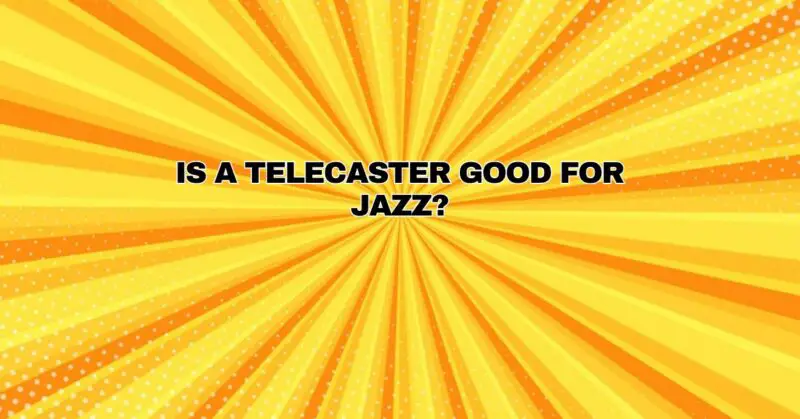When we think of jazz guitars, our minds often conjure images of archtops and semi-hollowbody instruments, famous for their warm, mellow tones that have graced the classic jazz recordings of the past century. In contrast, the Fender Telecaster, with its solid body and bright, twangy sound, might not seem like the obvious choice for a genre known for its complex harmonies and smooth, velvety timbres. However, as many seasoned jazz guitarists can attest, the Telecaster has carved out a niche for itself in the world of jazz, offering a unique and refreshing take on this timeless genre.
The Telecaster’s Beginnings
Before delving into its jazz credentials, let’s take a step back to explore the origins of the Telecaster. Introduced by Fender in the early 1950s, the Telecaster, often referred to as the “Tele,” was initially designed for country and rockabilly players. Its simple, no-frills design and single-coil pickups made it a versatile and durable instrument, perfect for the raucous sounds of early rock ‘n’ roll. But as musicians have shown time and time again, versatility knows no bounds.
The Unique Telecaster Sound
The Telecaster’s distinctive sound comes from its solid ash or alder body, bolt-on maple neck, and those iconic single-coil pickups. The bridge pickup, in particular, is known for its bright and twangy tone, which has made it a favorite among country and rock players. This twanginess might seem counterintuitive for jazz, where smoothness and warmth often take center stage, but the Telecaster’s unique tonal characteristics offer something different and intriguing in the world of jazz.
Telecaster Jazz Pioneers
To appreciate the Telecaster’s place in jazz, we should look to the pioneers who have successfully incorporated it into the genre. One such trailblazer is Bill Frisell, a highly regarded jazz guitarist known for his innovative approach to both composition and sound. Frisell’s use of a Telecaster, often with heavy reverb and effects, gives his jazz a distinct atmospheric quality, blending elements of Americana, folk, and jazz into a seamless whole.
Another Telecaster-wielding jazz virtuoso is Ed Bickert, a Canadian jazz guitarist celebrated for his lyrical playing and deep harmonic sensibilities. Bickert’s Telecaster, combined with his impeccable phrasing and tone control, allowed him to craft a unique voice in the jazz world. His work with jazz legends like Paul Desmond and Jim Hall showcases the Telecaster’s adaptability and range.
The Telecaster’s Jazz Adaptations
Part of the beauty of the Telecaster is its adaptability. Jazz players have found ways to tweak and modify their Telecasters to suit the genre’s demands. Some add a neck pickup to mellow out the tone, while others use pedals and amplifiers to sculpt a more traditional jazz sound. This versatility has allowed the Telecaster to transition from twangy country to smooth jazz seamlessly.
Exploring the Telecaster in Jazz
One of the key aspects of the Telecaster’s appeal in jazz is its ability to cut through the mix. In a genre that often features multiple instruments playing complex harmonies and melodies, the Telecaster’s bright, clear sound can be a welcome addition. It offers contrast, allowing the guitarist to stand out when needed while also blending in harmoniously when required.
Additionally, the Telecaster’s simplicity can be an asset. Jazz often involves intricate chord voicings and rapid improvisation. The straightforward design of the Telecaster, with its minimalistic controls and lightweight body, can be a refreshing departure from more complex jazz guitars.
Conclusion: A Unique Voice in Jazz
In the ever-evolving landscape of music, boundaries are meant to be pushed, and conventions are meant to be challenged. The Fender Telecaster, with its unconventional presence in the world of jazz, proves that a guitar’s sound is not solely defined by its traditional role. Instead, it’s the musician’s creativity, innovation, and dedication that ultimately shape the music they create.
While the Telecaster may not be the first choice for everyone in the jazz realm, it undeniably offers a fresh perspective, adding a dash of twang to a genre known for its smoothness. In the hands of skilled jazz guitarists, the Telecaster becomes a unique voice, reminding us that in music, as in life, it’s often the unexpected choices that yield the most exciting results. So, if you’re a jazz guitarist looking to make a statement or explore new sonic territories, don’t be afraid to pick up a Telecaster and embark on your own jazz journey with this remarkable and unconventional instrument.


